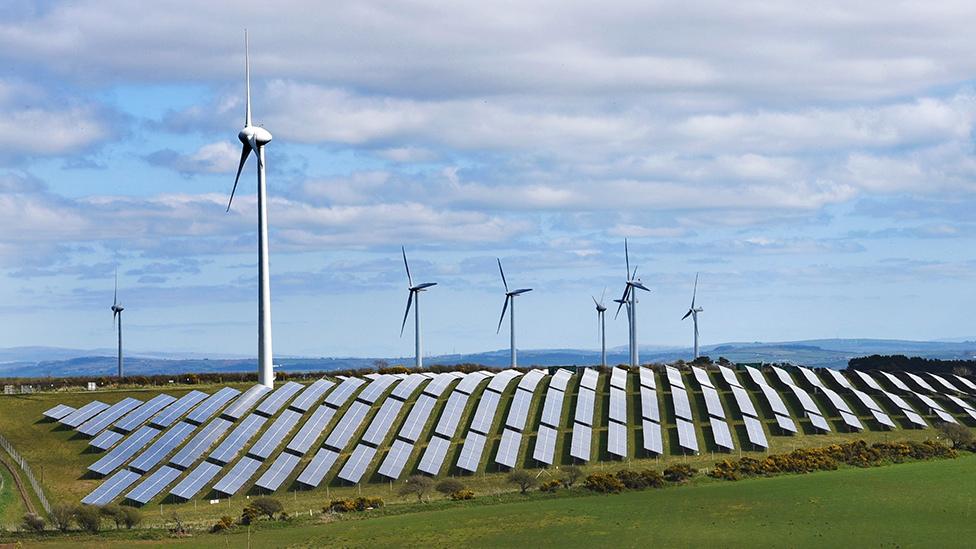Renewable energy overtakes fossil fuels for first time as UK's biggest source of electricity in 2020
- Published
- comments

For the first time, renewable energy overtook fossil fuels to be the biggest source of electricity in the UK in 2020.
Wind, solar, bio-energy and hydro (water) power generated a record 42% of UK power last year, while fossil fuels - mostly gas - produced 41%, according to a report by energy experts Ember and Agora Energiewende.
In 2019, renewables generated 37% of the UK's electricity, compared with 45% for fossil fuels.
Using renewables - often called 'green energy' - is better for the environment as it doesn't produce the same levels of emissions that can lead to climate change as using fossil fuels and it also doesn't use up the Earth's resources in the same way.
Wind blowing the competition away
In the UK, power that comes from wind turbines is growing each year making up nearly a quarter (24%) of the green energy production in 2020 - that's twice the share it had just five years ago and up from 2019 too.
Coal power, where coal is burned in in power stations to generate electricity made up just 2% of electricity production in 2020, while gas fell from 41% to 37% in 2020, the report shows.
Just 10 years ago, the UK generated more than three-quarters of its power from fossil fuels, mostly gas and coal, and just a small fraction - 7% in 2010 - from renewable energy,
Charles Moore, Ember's European programme lead, said "It is clear the UK has started its journey towards gas power phase-out in 2035 as recommended by the Climate Change Committee."
The committee, the UK's independent climate adviser, has said gas power plants which do not have technology to capture their carbon emissions should be closed by 2035 as part of efforts to tackle climate change.
What is renewable energy?
Renewable energy includes solar, hydro and wind energy.
Wind energy is made when the wind moves the blades on a wind turbine. This movement called kinetic energy is converted into electrical energy.
What is non renewable energy?
Non-renewable energy includes coal, gas and oil, also known as fossil fuels or hydrocarbons.
Most cars, trains and planes use non-renewable energy. They are made by burning fossil fuels to create energy.
Solar not shining as bright
However, it's not all good news. The experts point to solar power - which generates just 4% of UK electricity - as an area for improvement.
It has barely grown since 2018 and experts want the UK government to do more to convince people to install solar panels.
If you cannot see the interactive activity on this page, click here.
The future
The UK government has promised to cut greenhouse gas emissions to zero by 2050 to help tackle climate change.
It will also host the international COP26 climate conference in Glasgow in November 2021.
Greta Thunberg speaking at COP25 - the previous conference
The switchover between fossil fuels and renewables came as demand for electricity from industry and big businesses fell significantly due to pandemic lockdowns.
However, they say demand for electricity is set to increase again as more cars on the road become electric vehicles and homes switch from gas heated boilers to low-carbon heat pumps for heating and hot water which are powered by electricity.
- Published15 April 2020
- Published28 January 2021
